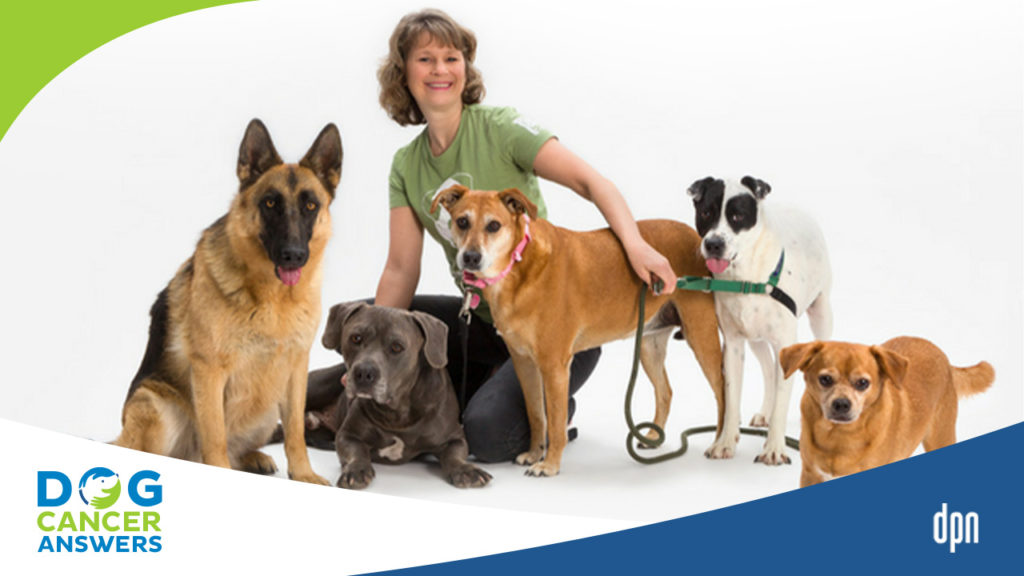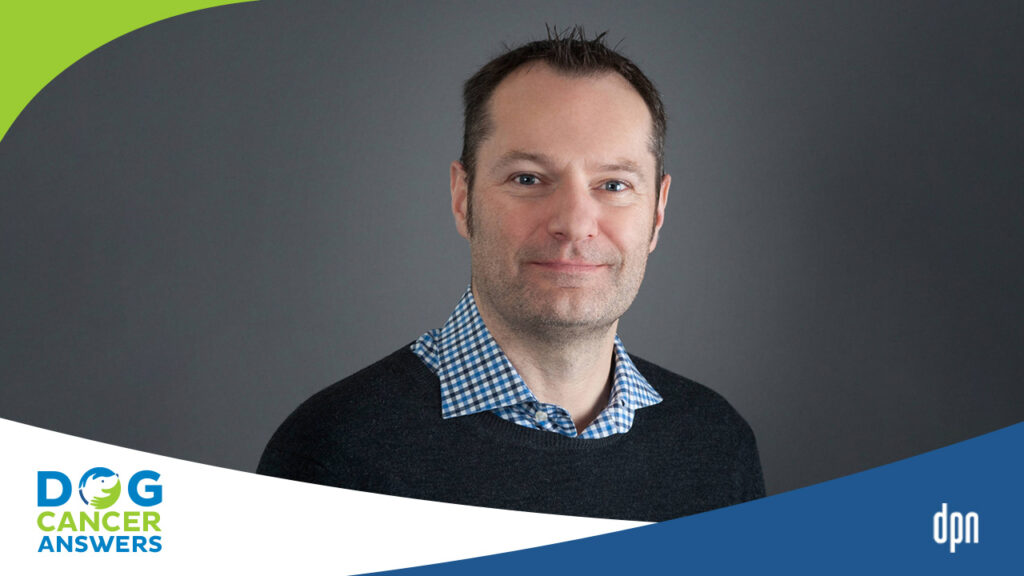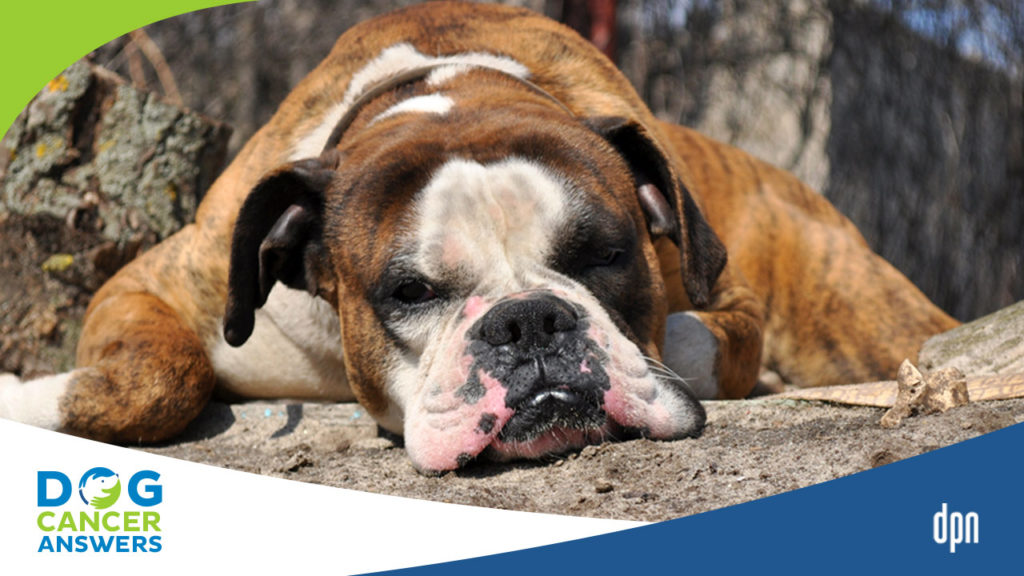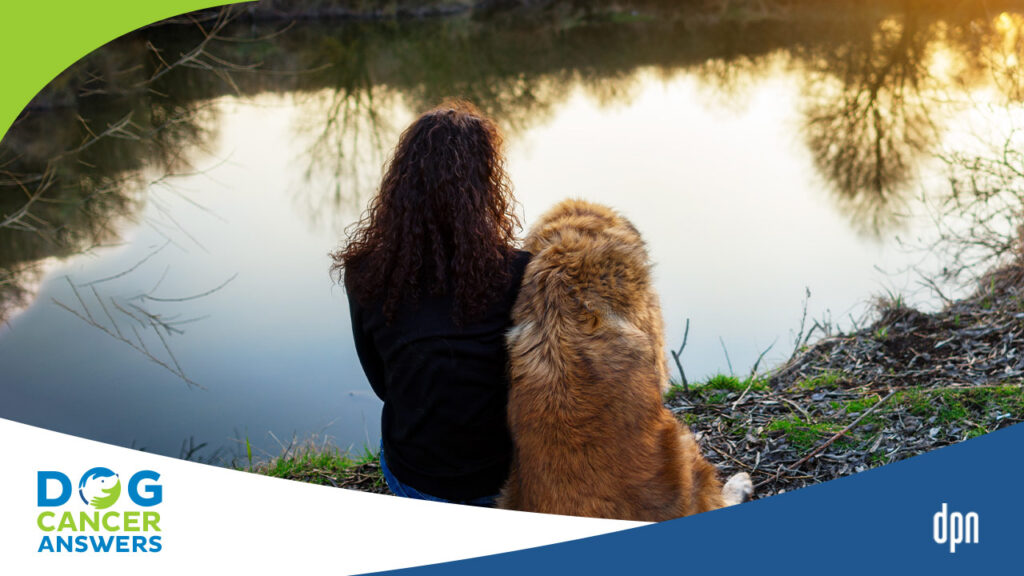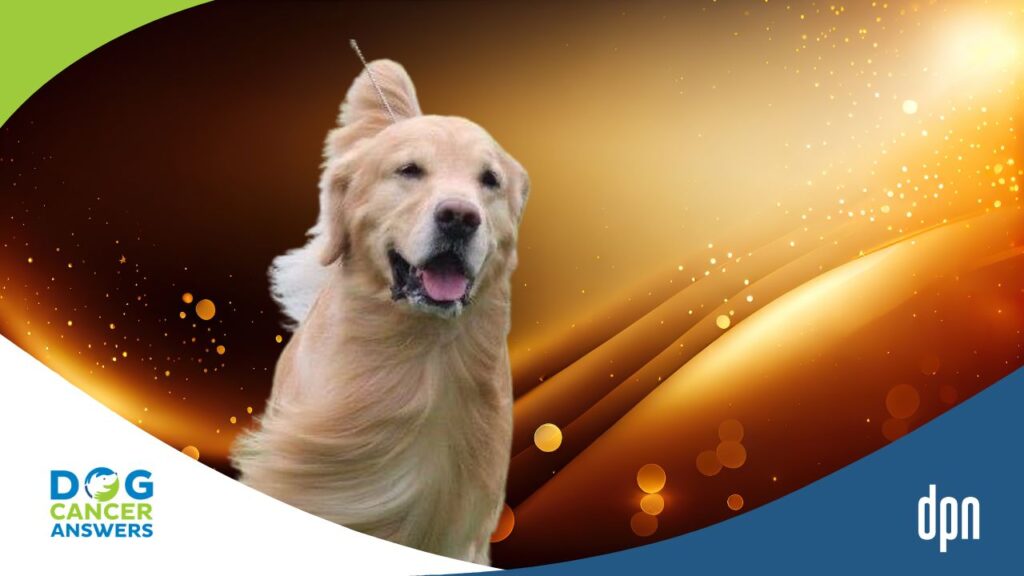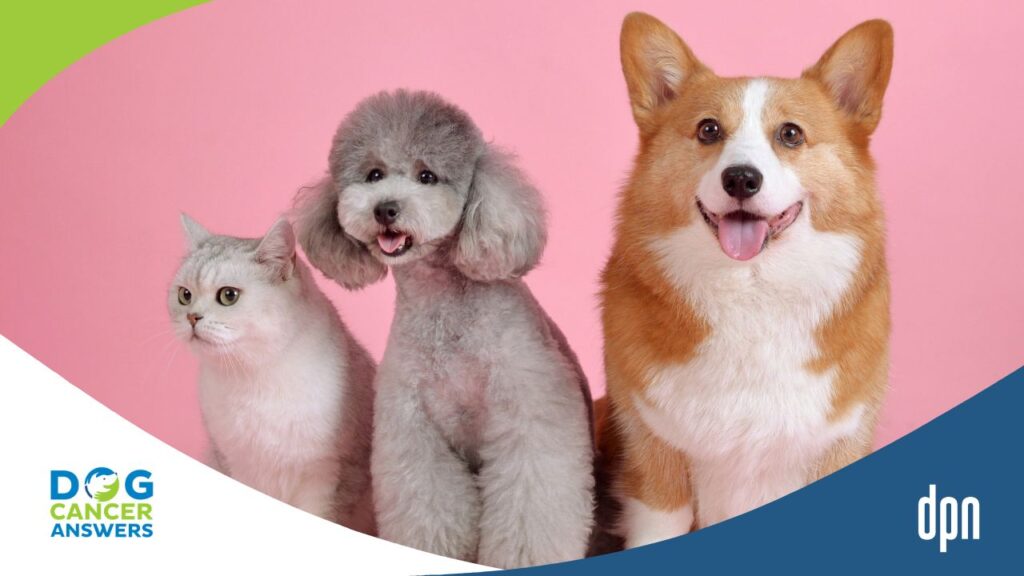EPISODE 123 | RELEASED June 21, 2021
Morris Animal Foundation’s Dog Cancer Research | Dr. Janet Patterson-Kane Deep Dive
Why is dog cancer so common? And why are Golden Retrievers more than twice as likely to get cancer as other dogs? Our guest, Dr. Janet Patterson-Kane, is digging for answers.
SHOW NOTES
The Morris Animal Foundation has been around for over 70 years. They are the leader in researching not just dog health, but cats and wild animals, as well.
Over three thousand dogs have participated in their Golden Retriever Lifetime Study. It’s the largest, most comprehensive canine health study in the U.S. What are they looking for?
Answers. Why do so many Goldens get cancer? And do these factors affect other dogs, as well?
With comprehensive health exams, samples, and questionnaires, they are researching the following questions:
- What nutritional factors might lead to dog cancer?
- What environmental factors might lead to dog cancer?
- What lifestyle factors might lead to dog cancer?
- What genetic risk factors might lead to dog cancer?
The study has yielded four papers so far, with many more to come. And today’s guest, Janet Patterson-Kane, is overseeing them all.
Dr. Patterson-Kane, Chief Scientific Officer at Animal Morris Foundation, joins us on today’s show. She discusses our current understanding of dog cancer and the hypotheses she’ll test. She also shares how her dog’s osteosarcoma diagnosis upended her life — and inspired her to dig deeper.
Make a gift to the Stop Cancer Furever campaign here:
https://www.morrisanimalfoundation.org/
See the Golden Retriever Lifetime Study here: https://www.morrisanimalfoundation.org/golden-retriever-lifetime-study
>> James Jacobson: [00:00:00] Today’s show is sponsored by The Dog Cancer Survival Guide, the best-selling book that helps you help your dog with cancer. Join the companion private support group at DogCancerSupport.com and get the email newsletter at DogCancernews.com.
>> Dr. Janet Patterson-Kane: [00:00:20] If you’re a veterinarian and it’s your dog, you want to find every possible answer that you can. And I know, I thought a lot about that. You know, you start to think, should I feed my dog differently or done something differently? And I think that’s where the Golden Retriever Study is so powerful. You know, all of these things that have happened to dogs where they’ve lived, what they think fed the problems they may have had.
What their genetics is. Are there things that we can kind of pick out there that tell us there’s an increased risk and that we should be more careful about certain things? Because most of cancer’s not genetic, it is actually about the environment and what happens to people and dogs.
>> Announcer: [00:01:02] Welcome to Dog Cancer Answers, where we help you help your dog with cancer. Here’s your host, James Jacobson.
>> James Jacobson: [00:01:10] Hello friend. We all know how common dog cancer is and that certain breeds are more susceptible than others. Among the most susceptible, are golden retrievers who have a 60% chance of getting cancer. It’s a distressing statistic for these beloved dogs and their owners, but also one that has baffled researchers and medical specialists for decades. To gather the long-term data needed to help understand why the cancer rate is so high among Goldens, the Morris Animal Foundation started the Golden Retriever Lifetime Study. Nine years on and more than 3000 golden retrievers later, the research remains pivotal in the search for the truth about this unwanted phenomenon. The findings of the study could potentially one day have a massive impact on early detection and treatment of canine cancer. Today in this Deep Dive, we’re discussing this landmark study with Morris Animal Foundation’s Chief Scientific Officer.
Her name is Dr. Janet Patterson-Kane, Dr. Janet, as she likes to go by, is a key opinion leader in veterinary medicine. Her accomplishments are well, they’re just way too many lists here. They are in the show notes, but it is important to know that she was the first woman to hold the prestigious Chair of Veterinary Pathology at the University of Glasgow’s veterinary school, which means she has seen a lot of canine tumors under her microscope. Doctor Janet Patterson-Kane, we’re going to call you Dr. Janet, thanks for being with us today on Dog Cancer Answers.
>> Dr. Janet Patterson-Kane: [00:02:56] Thank you for inviting me.
>> James Jacobson: [00:02:58] It is such a pleasure to have you on because we are massive fans of the Morris Animal Foundation. And even though we’ve been doing this for a while, we’ve never had anyone from Morris on. I think we’ve talked about it on our companion website, but we haven’t actually had anyone on our show. So I’m delighted to have you. What is your official title there? Because there are a lot of doctors there.
>> Dr. Janet Patterson-Kane: [00:03:22] Uh, well, I am the Chief Scientific Officer, so I am in charge of their grant funding programs and also our Golden Retriever Lifetime Study.
>> James Jacobson: [00:03:32] Okay. And I think we’re definitely gonna get into the Golden Retriever Lifetime Study because that is of such interest to our listeners because of the preponderance of golden retrievers that get cancer. But let’s first start off with a little background on Morris. You guys are not new. You’ve been around since the 1940s.
>> Dr. Janet Patterson-Kane: [00:03:51] .That is correct. So we were founded in 1948 by Mark Morris, Sr, who was a veterinarian. Very ahead of his time, actually. So he set up this foundation to fund research on cats and dogs, and then we started also funding horses, and then wildlife. And so since 1948, we’ve invested around about $136 million.
>> James Jacobson: [00:04:17] Wow. And then that’s in a variety of different studies for companion animals.
>> Dr. Janet Patterson-Kane: [00:04:22] Yeah, around about 3000 studies. And that includes wildlife as well.
>> James Jacobson: [00:04:27] So there is a strong focus on cancer, though.
>> Dr. Janet Patterson-Kane: [00:04:31] There has been, um, I mean, when we put our grant funding calls, researchers can really submit on any topic that’s relevant. Now, obviously, particularly for dogs, if you ask oh, you know, what’s the number one concern, dog owners are probably going to say cancer.
So we have funded a lot of cancer studies and obviously the Golden Retriever Study is focused on cancer as well.
>> James Jacobson: [00:04:56] What are some of the more exotic studies that may be interesting to our listeners? Cause we have a lot of veterinarians who listen to this program that you guys have helped to fund.
>> Dr. Janet Patterson-Kane: [00:05:06] I guess if you’re thinking exotic, you probably more focusing on wildlife, we do all sorts of exciting work there.
All over the world. One of the most recent studies I can think of that we funded is looking at effects of noise on dolphins in the seas around Malaysia. That’s the sort of evidence that you need to try and start changing policy. You know, if you’re demonstrating human disruption. You know, and there, there are many, many other studies. We do also fund research on cats, dogs, and horses around the world as well.
>> James Jacobson: [00:05:36] Okay. So it is broad in scope. So what do you know about Dr. Morris? This sounds like a pretty innovative veterinarian. Was he based in Colorado where you guys are, or where did he start?
>> Dr. Janet Patterson-Kane: [00:05:48] No, he started out east and then moved to Kansas where he spent most of his career. So, you know, he was doing things like using clinical pathology data before other vets were doing so. And you know, and the times that he started even being a veterinarian that focused on dogs and cats was pretty unusual. And the Foundation got started because he was asked by the owner of a seeing eye dog called Birdie to help them out because the stock had kidney disease.
And so he started researching the nutrition around this and in the process, he designed a pet food. So he was really out there with the prescription diets, right from the beginning, which subsequently did become Hill’s Pet Foods. So Hill’s Pet Food didn’t start off as a pet food company and we’re no longer associated with the Hill’s Pet Food Company, but that’s where it started.
>> James Jacobson: [00:06:40] But you do get a lot of funding from various pet food companies and animal pharma companies. They’re partners in your research.
>> Dr. Janet Patterson-Kane: [00:06:49] Yes. And I would say not in the sense often of driving the research. So a lot of companies will donate to studies that we have reviewed and started funding. We do have partners in the Golden Retriever Lifetime Study.
So we’ve started working with both Purina and Elanco and for our current Cancer Free Furever campaign, we’re working with, uh, Merck Animal Health, Petco Love, and the Blue Buffalo company. So, you know, they really have been the most amazing supporters for the work that we do.
>> James Jacobson: [00:07:19] Well, let’s talk about the Golden Retriever Lifetime Study. What is it?
>> Dr. Janet Patterson-Kane: [00:07:25] That’s a big question. Uh, so the Golden Retriever Lifetime Study was set up around about nine years ago. So we enrolled, it was supposed to be 3000 Golden Retrievers. We overshot a bit. So 3044 Golden Retrievers started the study and they were between six months and two years old at the time.
And the reason is that Golden Retrievers appear to have a cancer incidence of around 60%. If you look at dogs in general, it’s around 25%. So that is a really, really high cancer risk. So, what we’re doing is we’re following these dogs. And each year the owners fill out an extremely detailed questionnaire.
You know, it looks at everything from what they’re fed to how much exercise they get to their medical problems. And we get the veterinarians to do that as well. And the veterinarians take a series of samples, including serum, whole blood, urine, feces, hair, toenails. They’re all sent to a bio repository where they’re kept.
And we are collecting this data and the samples so that researchers can use them with the primary aim of finding out what are the main risk factors for cancer? Why are we seeing such a high incidence?
>> James Jacobson: [00:08:42] So the questionnaire is only done once a year, as the exams are done once a year. So it’s not a lot of overhead for these Golden parents.
What are some of the questions that are asked?
>> Dr. Janet Patterson-Kane: [00:08:53] I mean, it’s, it’s very detailed in every possible way. So, you know, they fill out a lot of information on what they feed these dogs, where their dogs spend time, you know, are they outside? Are they indoors? What are they doing? We actually send their blood sample to the clinical pathology lab.
So we get all that data every year as well. And you know, that includes all the usual things like serum chemistry, thyroid hormone, we look at their fecal specimens for parasites. So we have that as, as well, in addition to what we’re asking the owners.
>> James Jacobson: [00:09:27] And when the Goldens were recruited, was there a certain age they should be within like, did we recruiting senior Goldens or mainly puppies?
>> Dr. Janet Patterson-Kane: [00:09:36] Yeah. So they were between six months and two years. So they kind of range in age, right now. Recently we did recruit some extra dogs called the Golden Oldies, [laughter] which are dogs that, you know, there’s so many puns you can use golden for, so they were dogs, so we’re still recruiting those, over 12 years of age who have not succumbed to cancer, because we need some control dogs right now to start comparing some of the data with.
>> James Jacobson: [00:10:03] That must be a slightly more difficult group to recruit for.
>> Dr. Janet Patterson-Kane: [00:10:07] Actually it wasn’t. We were quite surprised. We initially wanted to get 200 samples and we were quite worried that we would get enough. And within a few weeks we were almost there.
So people have been very generous and, uh, we get them to see them, the photographs of their dogs as well. So we’ve had just some beautiful frosty faces, uh, coming in there. So people have being great and they went to the veterinarian and got those blood samples, this was for DNA, um, you know, completely at their own expense, which was amazing.
>> James Jacobson: [00:10:40] They have to be purebred Goldens for the study?
>> Dr. Janet Patterson-Kane: [00:10:43] Yes, they do. Yes. They have to be pedigree. And in this case we were collecting those samples because we’re doing something called genotyping on all the dogs in the study. Uh, we were looking at their genetic variation and seeing if that ties in with the risk of cancer.
>> James Jacobson: [00:10:59] Now I’m imagining the results are preliminary, but do you have any answer to that specific question at this point.
>> Dr. Janet Patterson-Kane: [00:11:06] Not yet, COVID kind of held us up. So the laboratory is still processing those samples and we’ll start to get that data through in the next few months, and that’s a massive amount of data we’re looking.
So if you think of the dog’s DNA, we’ve all seen that helix, uh, we’re looking at 1.1 million places along the DNA of each dog, and looking at the variation at each of those 1.1 million places. So you can imagine the amount of data that comes back. And we’re probably be looking at that for a few years.
>> James Jacobson: [00:11:39] That is fascinating. Are you only looking at the Golden Oldies for this study or the entire population of 3000 plus dogs?
>> Dr. Janet Patterson-Kane: [00:11:46] Yeah, this is the entire population. So the Golden Oldies are what we call the control. So these are the dogs we know, kind of won the game, you know, got over the line there without succumbing to cancer.
If you get to 12. That’s, that’s a pretty good, good age for a Golden Retriever.
>> James Jacobson: [00:12:02] So of the 3044 that you started with, how many have you lost?
>> Dr. Janet Patterson-Kane: [00:12:09] Quite a few and you know, this changes every day. So I’m not completely accurate here. We’re probably around 2200 right now. Now the dogs are around
>> James Jacobson: [00:12:18] You haven’t lost 2200. You’ve gone down to 22-
>> Dr. Janet Patterson-Kane: [00:12:20] We’ve still got 2200. Every week now we’re getting cancer diagnoses. So it’s kind of, uh, the peak age when you would expect to see a lot of that.
>> James Jacobson: [00:12:29] Okay. Let’s take a quick break here. And when we come back, I want to hear more about what it’s like for the owners who participate in this study. We’ll be right back.
And we are back with Dr. Janet Patterson-Kane, and we’re talking about the Golden Retriever Lifetime Study. Now, people who enrolled in the study obviously knew that one of the biggest things that they were looking at was the why is this such a prevalent thing in Goldens? Are you getting feedback from people who are saying, this is just really painful to be seeing this and such, you know, to experience this, and to go through this firsthand and to be chronicling this and presumably the, the cancer diagnosis as well.
>> Dr. Janet Patterson-Kane: [00:13:17] It’s been interesting, because you have this big group of people and they actually have a Facebook group as well, called 3000 Strong. And not everyone’s on that, but a lot of them are. And so, you know, they’ve gotten to know each other and you kind of see this news coming through and I find it kind of hard myself, you know, to see this.
And I think it brings it home. How common it is, and what people have to go through. You know, we make a lot of efforts to make sure they have a memorial for their dog, that we keep in touch. Because a lot of people, they’re not just losing their dog that’s, at that point they leave the study, which has been such a big part of their lives.
So we really do focus on remaining in touch and supporting the people in the study, particularly now, as we really get down to the bitter end. I mean, at some point none of these dogs are still going to be with us. So, that’s kind of the reality of what we’re doing.
>> James Jacobson: [00:14:11] You’ve already had four papers that have come out of the study so far.
>> Dr. Janet Patterson-Kane: [00:14:14] Yeah.
>> James Jacobson: [00:14:15] Talk about those and then talk about where you think this study is going to lead.
>> Dr. Janet Patterson-Kane: [00:14:20] Yeah. You know, if you look at human studies where they’ve done things like this, it takes them several decades to get to the point where they start publishing because of the lifespan of human beings. So the beauty of a canine cancer study, is, you know, right about the point we were starting to generate a lot of data, we’re starting to see enough cancer patients and so forth. So the first papers that came out really described the study and the dogs that were enrolled in the study. We’ve had a paper come out recently about compliance, which is what helps people, or what sort of people tend to stay in the study.
And an interesting fact from that is that, if, uh, the dog sleeps in their bedroom, they’re more likely to stick with it.
>> James Jacobson: [00:15:06] That is one of the things that we talk about all the time, and we say, where does your dog sleep in your bedroom or in your bed or not? And we find that so many of our listeners like enormous number of our listeners have their dogs sleep in their bedroom, or bed.
>> Dr. Janet Patterson-Kane: [00:15:22] Yeah, I’m one of those, I’m one of those people.
>> James Jacobson: [00:15:24] Now compliance is a term that if you’re not in the veterinary space, you’re not familiar with it. Describe that for everyone.
>> Dr. Janet Patterson-Kane: [00:15:31] Yeah. So, I mean, there’s probably different levels of it in our study, but compliance means that you’re following the instructions. You’re doing what you’re supposed to do.
And we have all sorts of levels here, because we need the owner to fill out the questionnaire. We need the vet to fill out the questionnaire. We need the owner to take the dog to the vet, and have the samples taken. So sometimes people may even just miss a year for some reason, but we can bring them back into the study the next time.
So we’re still over 80% at this point, which is quite remarkable.
>> James Jacobson: [00:16:03] That’s awesome. Okay. So the four papers that have come out so far, what are those covered.
>> Dr. Janet Patterson-Kane: [00:16:09] Yeah. As I said, mainly summarizing the study, there was one that came out on fertility and the one on compliance. So yeah, let’s talk about where this is going, because we’ve really started to get the momentum here.
So we’ve had some requests for people if they want to get samples from us. And we have, some of those studies have started up now. So we’re getting some samples back out of the freezer. And giving them to researchers to use
>> James Jacobson: [00:16:35] Samples of
>> Dr. Janet Patterson-Kane: [00:16:36] Of serum, mainly at the moment. We also have what we call data commons, where we have some of the data available on the computer there, and researchers can get a log in from us and go in and, and use that data.
You know, we have some projects, we started to develop with partners. So we’re going to see a lot more happening over the next year or two.
>> James Jacobson: [00:16:59] So you guys are basically the repository for collecting this data, but not the exclusive analysts of it.
>> Dr. Janet Patterson-Kane: [00:17:06] Absolutely, I mean, we’re working with scientists all over the world, uh, both academic and in the private sector, because you know, we’ve followed 3000 dogs for this long.
We want to get as much as we can out of it. Particularly, you know, with respect to cancer. And if you think about it, when a dog gets cancer in our study, we have samples from that dog for every year proceeding it. Uh, so a lot of people are interested in finding out if there are early markers or signs of cancer, so we can start diagnosing this early.
>> James Jacobson: [00:17:41] Well as a scientist, as a researcher, you have some hypotheses, I’m sure, that you want to test. What are those?
>> Dr. Janet Patterson-Kane: [00:17:48] You know, I think we’re seeing this in the human field as well, that I think it is probably quite likely, we can detect that cancer is going to occur or is in its early stages, quite a way before.
So in humans, for example, if we think of pancreatic cancer, they start to see differences in proteins in the blood, sometimes some years beforehand. I think that’s really where we want to get with our dogs. You know, by the time based dogs are diagnosed, cancers are often quite advanced. It would be fantastic to have your dog sampled every year and pick these things up before they get to the stage that they do.
>> James Jacobson: [00:18:28] The role of diet is something that most dog lovers fret about. How important is that from the preliminary data that you’re looking at.
>> Dr. Janet Patterson-Kane: [00:18:38] We haven’t really gotten any results on that. And when you look at diet and you’ve only got 3000 dogs, and if you look at what’s happened to pet food over the lifespan of the study, there’s just so many varieties and types of foods.
So we’ve really only started tackling that data to try and clean it up and summarize it a little more. So I’m afraid I don’t have any great insights as yet, but we are working on it.
>> James Jacobson: [00:19:04] Because I imagine the fact that the pet food industry and trends in what people feed their dogs, the fact that that has changed so massively in the last decade will probably complicate whatever results you get because people started with one thing and they’re doing something different today.
>> Dr. Janet Patterson-Kane: [00:19:20] Yeah. And there’s just so many different brands now and different types. Some of those foods have changed over time. So it’s not an easy thing to capture.
>> James Jacobson: [00:19:30] Are you looking at the role of supplementation as well?
>> Dr. Janet Patterson-Kane: [00:19:33] Yeah, we are. Yeah. I mean, we pretty much ask them everything and a lot of owners give us a lot of data.
So there’s, there’s a lot of data. We’re going to be looking at this for years and years.
>> James Jacobson: [00:19:44] Does your dog prefer cotton or flannel sheets? Important questions like that?
>> Dr. Janet Patterson-Kane: [00:19:48] Pretty much, something like that. Yeah.
>> James Jacobson: [00:19:49] It is time for another short break. We will be right back.
And we are back with Dr. Janet Patterson-Kane, Chief Scientific Officer of the Morris Animal Foundation. Um, so I can detect a bit of an accent you, uh, started, uh, not in the United States. You are from, you have, uh, a wide variety of academic experiences. Talk about that and how you got to this.
>> Dr. Janet Patterson-Kane: [00:20:18] Yeah, it’s kind of like a world tour.
Uh, sorry. I’m actually from New Zealand originally. I probably should have mentioned that, that at the beginning cause people just sit there going where’s that accent from? And, um, you know, I trained as a veterinarian in New Zealand and I did my PhD there, but I trained as a pathologist at the University of Florida actually. Spent some time in Kentucky.
And then I’m back to an academic career where I worked in London and Queensland, Australia, and Scotland. Left the academic sector, and I worked here for a while in the private industry, including biotech. And then, uh, while I was sitting here in Denver working in the biotech industry, I got an email asking me to be on a scientific review board for the Morris Animal Foundation, which I was just thoroughly delighted, because certainly the veterinary profession loves the Morris Animal Foundation.
So I sat on that for a couple of years. And over that time, the Chief Scientific Officer position came available. So, you know, I went for it. Because it’s a pretty amazing and exciting job.
>> James Jacobson: [00:21:27] How many colleagues do you have there?
>> Dr. Janet Patterson-Kane: [00:21:29] So we’re based in Denver, Colorado. So our staff is around about 15. So, given what we do all over the world, it’s a pretty small group of people.
And we rely a lot on, uh, scientific volunteers sitting on review boards and so forth.
>> James Jacobson: [00:21:45] I want to explore a little bit more on your own personal experiences with cancer. I’m imagining that when you were a practicing veterinarian and in your academic studies, you have looked a lot at cancer. What are your thoughts about the prevalence of cancer these days in dogs?
>> Dr. Janet Patterson-Kane: [00:22:04] Yeah, I think as a pathologist. So I’ve done a lot of diagnostic work. I actually haven’t been in practice for quite a while. It’s about 30 years ago. So, [laughs]
>> James Jacobson: [00:22:14] You kind of remember what they look like. [laughter] They have these,
>> Dr. Janet Patterson-Kane: [00:22:16] I do, I do. Uh, and so, yeah, you know, you, you spend most of your day as a pathologist looking at cancer samples, mainly from dogs, but you know, quite a lot from cats and also horses, you know, uh, It’s definitely a problem with them as well.
I would say my impression is that most of the samples come from pedigree dogs, but not always, but that you know, they definitely predominate. And we know that, you know, as we’ve just been talking about some breeds are very prone and, you know, I would have to say also with my own pets has also colored the way I look at it.
So several years ago, my dog, Satu, was diagnosed with osteosarcoma, which was, I found that it was a big surprise. He’s not really the type of breed I would have expected. Uh, and it was a very upsetting experience because as a pathologist, you know, you see these pretty terrible tumors, but now as an owner, I’m in the situation where I’ve got this dog that looks pretty healthy, but he’s got to have his leg amputated, and the likelihood he’s going to make it to a year after that, as you know, or more than a year after that is pretty slim. So then I’m going through this as an owner, going through the amputation, the chemotherapy, my attitude to wanting to do that completely changed. So once it was my own dog, I couldn’t do enough, you know, to keep him going.
And even three months after the amputation, I felt it was worth it because we had such a great time and he adapted so well. And then as it turned out, he survived four years and he pretty much died of old age. So he made it to 14. So there are these outliers, you know, that sometimes, you know, dodge to the statistics.
And it’s kind of interesting to know why is that? Why do some animals kind of beat the odds?
>> James Jacobson: [00:24:12] How did that impact you personally? Cause you, you came in, it sounds like more like a sober scientist, as a pathologist who sees this all the time, but when you experienced it with your dog and your dog, so massively beat the odds because I think the odds with osteosarcoma about a year, right?
>> Dr. Janet Patterson-Kane: [00:24:28] Yeah. If you’re lucky.
>> James Jacobson: [00:24:29] If you’re lucky, what did you do, and what was the mindset that shifted?
>> Dr. Janet Patterson-Kane: [00:24:33] Yeah, I think I probably had a more academic attitude to it. And then once my own dog had gone through it, definitely my attitude as I was kind of filling out these reports, you know, as a pathologist, you’re sending a report to a veterinarian, but trying to be supportive and saying how sorry I was and trying to find, uh, other things I could say that that were helpful because the other thing about being a pathologist is there’s not much you can do. Well like you, you’re diagnosing, and you’re saying, this is what it is. It made me more determined as I move forward in my career to do something about it. So I went and worked for a company here that works on image analysis of cancer samples.
So I actually worked with human cancer samples for a while. And I guess what I took from that was that, you know, there’s a lot we can do with animals and in the veterinary field, that is just as clever, and although we don’t have as much money, you know, there’s a lot that can be done and is being done.
So I would say it completely changed my life to be honest, because Satu was a very special dog to me. And I think everyone out there knows about those ones.
>> James Jacobson: [00:25:42] Uh, yeah, we all have those heart dogs, like Satu. Um, did you like engulf on a whole, like, process to, you know, read books and diet and all sorts of things that you hadn’t normally done.
>> Dr. Janet Patterson-Kane: [00:25:55] Yeah. That’s a good question. And that’s exactly what I did, because even if you’re a veterinarian, it’s your dog. You want to find every possible answer that you can. And I know I thought a lot about that. You know, you start to think, should I feed my dog differently or done something differently? And I think that’s where the Golden Retrievers study is so powerful.
You know, all of these things that have happened to dogs, where they’ve lived, what they’ve been fed, the problems they may have had, what their genetics is. Are there things that we can kind of pick out there that tell us there’s an increased risk and that we should be more careful about certain things, because most of cancer is not genetic.
It is actually about the environment and what happens to people and dogs.
>> James Jacobson: [00:26:41] And there’s not one thing that causes it. It’s a variety of factors.
>> Dr. Janet Patterson-Kane: [00:26:45] Yeah.
>> James Jacobson: [00:26:46] So with Satu, did you, I don’t know, did you change his diet?
>> Dr. Janet Patterson-Kane: [00:26:49] We didn’t in the end, you know, because at that point you think, well, he’s got a year, so just let him eat whatever he wants and then he survives four, so, you know, he did pretty well.
We have this amazing set of photos a friend of ours took where he was still on chemotherapy, but he’s just leaping through the park after this ball. And he looks amazing and everyone would kind of look and think there’s something not quite right about that
>> James Jacobson: [00:27:15] Where’s his fourth leg?
>> Dr. Janet Patterson-Kane: [00:27:16] [laugh] Yeah, and not realize there’s a leg missing, so
>> James Jacobson: [00:27:19] It must be the angle of the camera. Yeah. Sometimes you just see these tripawds and they just look like they are just, normal health. And then you look, there’s something odd. Is the camera angle. Wait, it’s missing a leg. So it’s, it’s pretty cool. Um, you touched on the human angle you went to work for a human health company.
Let’s talk a little bit about this whole concept of One Health, which I’m assuming that some of these studies like the Golden Retrievers Study are going to impact where we’re looking at something in animals because of their condensed life and then extrapolating to the human world and vice versa.
>> Dr. Janet Patterson-Kane: [00:27:56] Yeah, it depends what you’re thinking about. I mean, when you look at cancer research in cancer treatment, in the world, it’s almost all focused on people. So the money that goes to animals is just a drop in the ocean. And so Morris Animal Foundation is actually, you know, the largest funder in this area. If you put dogs and cats and horses and wildlife together. So a lot of things happen in the human realm that then get brought back in and used in, you know, dogs and cats and so forth. But there’s a lot that can go the other way. And they’re also cancers that occur in dogs that aren’t that common in people. So we’re not going to be able to rely and what goes on there to help us. So if you look at Golden Retrievers,
>> James Jacobson: [00:28:43] Like osteosarcoma.
>> Dr. Janet Patterson-Kane: [00:28:44] Yeah, well, osteosarcoma is actually quite common in children and young adults. And, uh, I think that there’s a lot of great research going on with dogs, that’s going to be very useful for children, but the other big cancer we see in Golden Retrievers are something called Hemangiosarcoma, which I’m sure many of your listeners will be familiar with, terrible disease that develops from blood vessels. That’s not really, all that sort of thing, isn’t common in people, and doesn’t really occur in the same way. So if we’re going to do something about it, we’re going to have to do it in dogs for dogs, and that doesn’t really involve humans at all.
So I think it varies depending on what you’re looking at.
>> James Jacobson: [00:29:25] So the Morris Animal Foundation is funded through donations, and you are obviously a 501C3, and you’re always actively looking to raise funds. And I know you have a fundraiser coming up, but I think we’re in the midst of it right now. But then you have an event the end of June of this year.
>> Dr. Janet Patterson-Kane: [00:29:45] Yeah. So we have the virtual, these days, Stop Cancer Furever challenge. That’s on June the 26th, and you have to kind of choose what you’re going to do. So you just sign up on our campaign page and our website, and you come up with some challenge that you might want to do for your friends or your family.
You know, you can be pretty imaginative. Last year, we were in lock down. So I had to do my virtual walk pretty much in the back garden. And so I advertised that my cats were going to be participating. And when we got to it, the harness training had not progressed as well, you know, as I thought it might have.
And so, Ella the Husky cross had to kind of take over, and when she’d finished, she ripped up one of the cat’s harnesses, which the cat wasn’t going to be in. So I don’t know if anyone wants to do that. I think you could think of all sorts of other things that you might want to do.
>> James Jacobson: [00:30:36] What were some other creative fundraising ideas that people did in the Furever challenge “fur” F U R ever challenge?
>> Dr. Janet Patterson-Kane: [00:30:44] Well, this year we saw someone had a concert, which is actually up online. You know, you could more do exercise challenges. You can read a book, you can, knit something, we don’t care what it is, as long as it’s fun and imaginative, and, you know, we raise some money for our pets and their issues with cancer.
>> James Jacobson: [00:31:04] And then that money is being doubled by your large partners, right?
>> Dr. Janet Patterson-Kane: [00:31:09] Yeah. So, um, we have a dollar match up to $200,000, and that’s coming from Merck Animal Health, Petco Love, and the Blue Buffalo Company. And they’ve just been incredibly generous in providing that funding. We just, you know, it’s been hard to believe through the pandemic, how supportive companies and other donors have been of the Foundation.
>> James Jacobson: [00:31:36] And we will put links in the show notes. If you want to participate in the Furever campaign and help out the Morris Animal Foundation. Well, Dr. Janet, I want to thank you for being with us. This has been a pleasure.
>> Dr. Janet Patterson-Kane: [00:31:50] You also, and thank you for inviting us at last. It’s great to have your support.
>> James Jacobson: [00:31:55] Dr. Janet Patterson Kane, Chief Scientific Officer for the Morris Animal Foundation. You heard a bark in the background for the first time. Dr. Janet. Thank you so much.
>> Dr. Janet Patterson-Kane: [00:32:04] Thank you. I’d have to say that’s not my dog.
>> James Jacobson: [00:32:08] That was a great conversation with Dr. Janet Patterson-Kane.
I’d like to thank her for taking her time to be with us today. If you are ever looking for an organization to support related to dog cancer research, the Morris Animal Foundation is the leader in the field. You can find them at MorrisAnimalFoundation.org, and we’ll put the link in the show notes. Also in the show notes, you will find information on the sponsor of our show, The Dog Cancer Survival Guide, by Drs. Demian Dressler and Susan Ettinger. Also be sure to join our Facebook group Dog Cancer Support, which you can find at DogCancerSupport.com or on Facebook. And of course, get on our email newsletter list by going to DogCancerNews.com.
All the links to this are in the show notes, and you can find them in your podcast app or on our website at DogCancerAnswers.com. Thanks again to Dr. Janet for her time. Thank you for listening. I’m James Jacobson on behalf of all of us here at Dog Podcast Network, I’d like to wish you and your dog a very warm aloha.
>> Announcer: [00:33:22] Thank you for listening to Dog Cancer Answers. If you’d like to connect, please visit our website at dogcanceranswers.com or call our Listener Line at (808) 868-3200. And here’s a friendly reminder that you probably already know. This podcast is provided for informational and educational purposes only. It’s not meant to take the place of the advice you receive from your dog’s veterinarian.
Only veterinarians who examine your dog can give you veterinary advice or diagnose your dog’s medical condition. Your reliance on the information you hear on this podcast is solely at your own risk. If your dog has a specific health problem, contact your veterinarian. Also, please keep in mind that veterinary information can change rapidly.
Therefore, some information may be out of date. Dog Cancer Answers is a presentation of Maui Media in association with Dog Podcast Network.
Hosted By
SUBSCRIBE ON YOUR FAVORITE PLATFORM
Topics
Editor's Picks
CATEGORY


